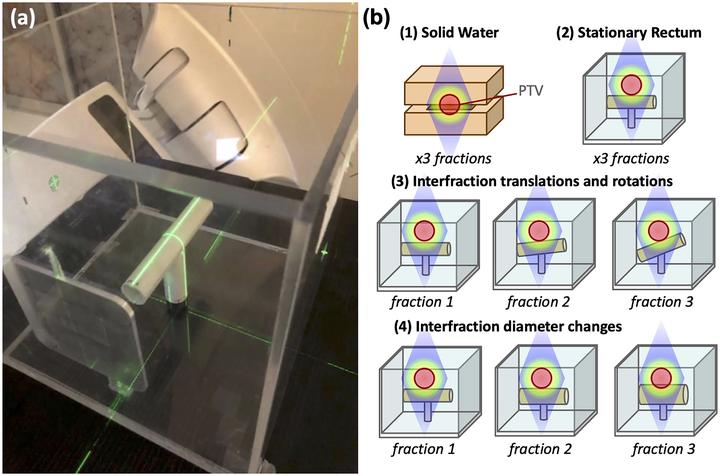 Image credit: Haley Patrick
Image credit: Haley PatrickAbstract
Background: Dose-surface maps (DSMs) are an increasingly popular tool to evaluate spatial dose-outcome relationships for the rectum. Recently, DSM addition has been proposed as an alternative method of dose accumulation from deformable registration-based techniques. In this study, we performed the first experimental investigation of the accuracy at which DSM accumulation can capture the total dose delivered to a rectum’s surface in the presence of inter-fraction motion. Material and methods: A custom PVC rectum phantom capable of representing typical rectum inter-fraction motion and filling variations was constructed for this project. The phantom allowed for the placement of EBT3 film sheets on the representative rectum surface to measure rectum surface dose. A multi-fraction prostate VMAT treatment was designed and delivered to the phantom in a water tank for a variety of inter-fraction motion scenarios. DSMs for each fraction were calculated in two ways using CBCT images acquired during delivery and summed to produce accumulated DSMs. Accumulated DSMs were then compared to film measurements using gamma analysis (3%/2 mm criteria). Similarity of isodose clusters between films and DSMs was also investigated. Results: Baseline agreement between film measurements and accumulated DSMs for a stationary rectum was 95.6%. Agreement between film and accumulated DSMs in the presence of different types of inter.-fraction motion was greater than or equal to 92%, and isodose cluster mean distance to agreement was within 1.5 mm for most scenarios. Overall, DSM accumulation performed the best when using DSMs that accounted for changes in rectum path orientation. Conclusion: Dose accumulation performed with DSMs was found to accurately replicate total delivered dose to a rectum phantom in the presence of inter-fraction motion.